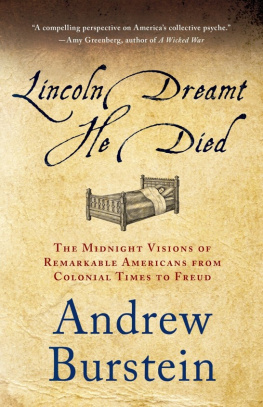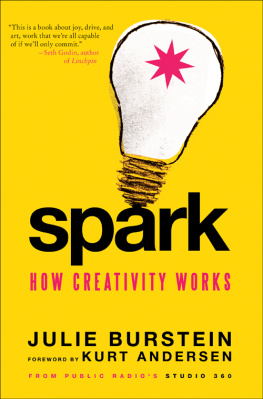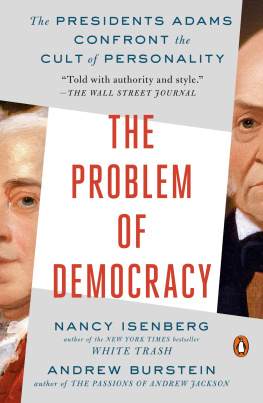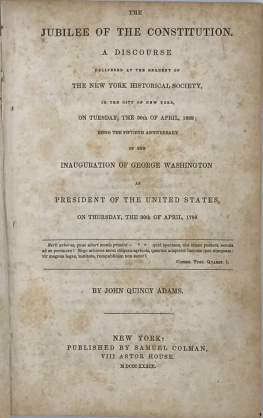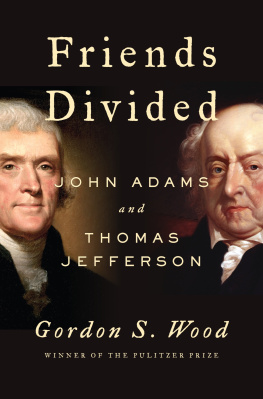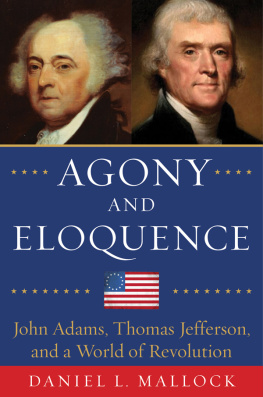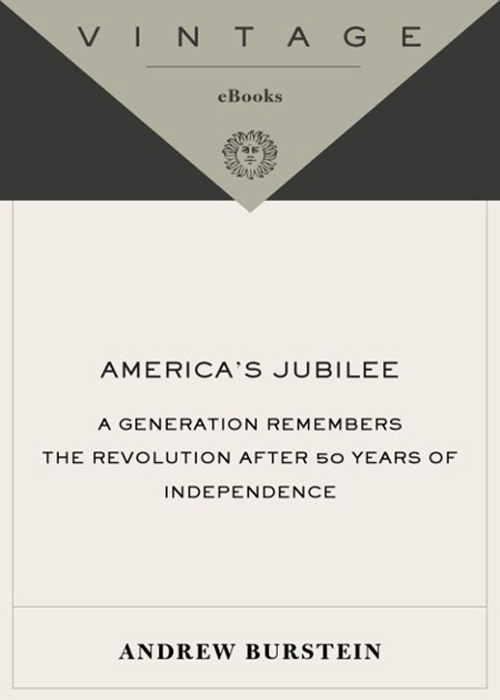
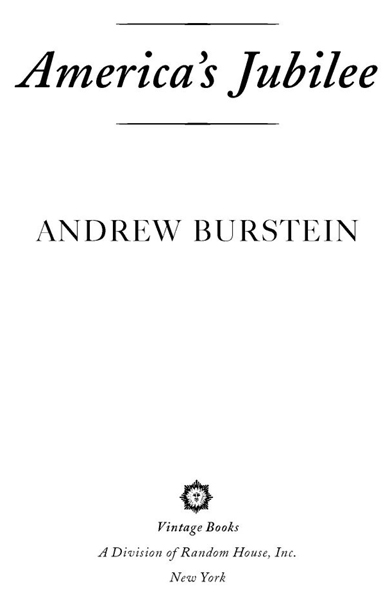
Table of Contents
For Nancy
And all that Memory loves the mostWas once our only Hope to be,And all that Hope adored and lostHath melted into Memory.
Lord Byron
ACCLAIM FOR ANDREW BURSTEINS
Americas Jubilee
A snapshot of a nation in transition.... An excellent work. Booklist
Burstein opens a window in 1826 showing the politics, business and everyday lives of Americans. The Oregonian
A captivating book about how the people of 1826 marked that fiftieth Fourth of July. The Dallas Morning News
Gives the reader valuable insights into the everyday rhythm of living in America in 1826. The Roanoke Times
Spirits readers back to the 1820s.... [A] well-documented look at people and events of the era. Fort Worth Morning Star-Telegram
[An] eminently readable re-creation of post-revolutionary America.... Burstein seizes the patriot in us very quickly. The Orlando Sentinel
An affecting portrait.... Bursteins evocative reconstruction shows Americans pausing to consider where they had been and where they were going. Kirkus Reviews
Readers curious about life in America a generation into the nineteenth centuryduring a crucial period when the last of the Founders were bequeathing their revolutionary handiwork to their childrenwill find a great deal of interest and value here. The News & Observer
Illustrations and Maps
. Invitation to the ball held in honor of Lafayette.
. A Byronic likeness of Attorney General William Wirt.
. Postscript, letter of William Wirt to his daughter Agnes.
. Dedication page of Eliza Forters Yorktown: An Historical Romance.
. Ruth Henshaw Bascom and Ezekiel L. Bascom.
. Ohios Governer Ethan Allen Brown, born July 4, 1776.
. Advertisment for boys boots.
. "Plough Againstthe world."
. Ohio state seals.
. The U.S. Capitol in the 1820s.
. Advertisment placed by Pennsylvania Avenue hairstylist John Scotti.
. President John Quincy Adams.
. South carolinas Congressman George McDuffie.
. John Randolph of Roanonke and Henry Clay of Kentucky.
. A martial portrait of Andrew Jackson .
. Jefferson survives.
. The Bascoms MAssachusetts.
. Ohio Cannal, 1826.
Chronology
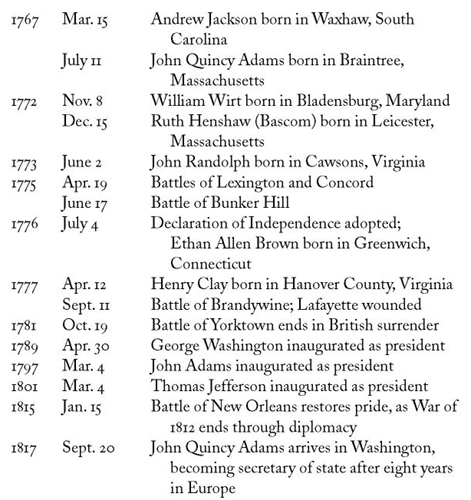
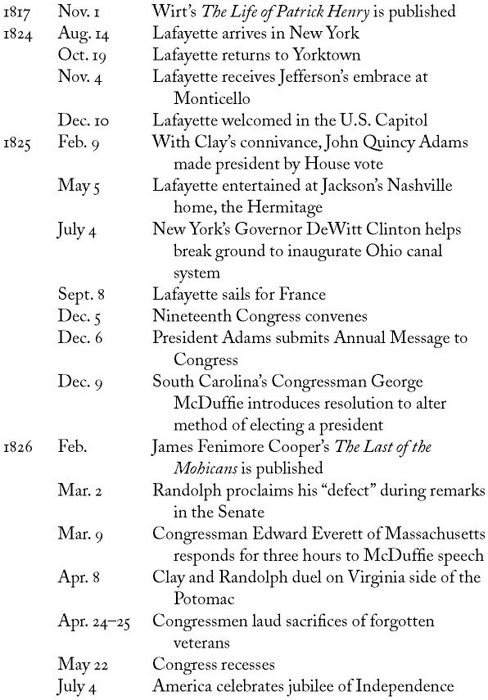
Introduction
ON TUESDAY, July 4, 1826, cities and towns across America celebrated the fiftieth anniversary of the Declaration of Independence. There were elaborate parades and speeches, and dignified Revolutionary War veterans on display for awestruck youth. It is a moment that American history has forgotten, a moment when two critical generations reaffirmed their connection. The rising generation, having come into its political inheritance, stopped to acknowledge what had silently occurred some time earlier: it had separated from its constituting predecessor, it had taken the place in society of those who had given birth to the United States.
In his inaugural address the year before, the president of the United States, intellectually gifted John Quincy Adams, hailed the sons and daughters of the Revolutionaries for their zeal in sustaining popular government during a period of unprecedented growth. Between Independence and the mid-1820s, Americas population had tripled to twelve million, while its territory had more than doubled on the strength of Thomas Jeffersons Louisiana Purchase alone. The nations newest flagit was just being dubbed Old Gloryhad twenty-four stars, aligned in four rows of six. And the federal Constitution, having stood the test of time, was, as the new president reminded his fellow citizens, put in place by the founders to promote the general welfare and secure the blessings of liberty to the people of this Union, in their successive generations.1
Successive generations. Harking back, Adams used superlatives to describe the nations forefathers, his own father among them. They were illustrious benefactors, eminent men with giant aspirations, who had seen the first four million inhabitants through a most eventful period in the annals of the world. Now, momentously, it had fallen to their heirs to secure continued freedom and happiness for the twelve million and growing: We now receive it as a precious inheritance from those to whom we are indebted... to transmit the same, unimpaired, to the succeeding generation. The first half-century constituted a lesson in legitimacy. The groundwork was complete. Posterity would judge the successors on how well they carried through the work of the founders.
July 4, 1826. Fifty years of independence. So significant a Fourth of July apparently merited a sanctification beyond what citizens already rich collective imagination had conceived. This unspoken wish was granted as the long lives of patriots Thomas Jefferson and John Adams ended within hours of each other on that memorable day. The author of the Declaration, who had since achieved Olympian status as the Sage of Monticello, expired just before 1:00 p.m. in Virginia. His warm-blooded fellow committeeman in the Continental Congress of 1776, who was probably the boldest member of that body to cry out for Independence, died at approximately 5:00 p.m. in Massachusetts. Both passed from the world in the presence of watchful, doting family, a slender Jefferson at eighty-three, a stout Adams at a remarkable ninety. Could any more unearthly coincidence have been imagined?
In his March 1825 inaugural address, the public-spirited son of John Adams had been the first to sound the jubilee. The election year of 1824 was the fiftieth anniversary of the creation of the Continental Congress, Americas first united governing body. And so, John Q. Adams fittingly remarked: The year of Jubilee, since the first formation of Our Union, has just elapsed; that of the Declaration of our Independence, is at hand. In the western part of the Union, the Kentucky Reporter picked up on the presidents allusion with a noticeable satisfaction. Think of all the associations we know of, its editor surmised. Among the Jews [the word jubilee] denotes every fiftieth year... at which time all the slaves were made free, and all the lands reverted to their original owners.... Jubilee, in a more modern sense, denotes a grand church solemnity or ceremony. The Reporters research revealed that Edward III of England had caused his fiftieth birthday in 1362 to be observed in the manner of a Jubilee... , releasing prisoners, pardoning all offenses except treason, making good laws, and granting many privileges to the people. The application of the term to America in the 1820s, the editor explained, did not have to lead to an acceptance of the minutiae of this ancient institutionlest one forget, Kentucky was a slave statebut simply reminds us of the general spirit of the Jubilee at a time of universal felicitation and good feeling. 2
Only the audible was missing from this description of a jubilee. Although the Reporter did mention that the year of jubilee was traditionally introduced by music, it did not specify that among the early Hebrews a rams horn was used as a trumpet, or that the Latin
Next page

